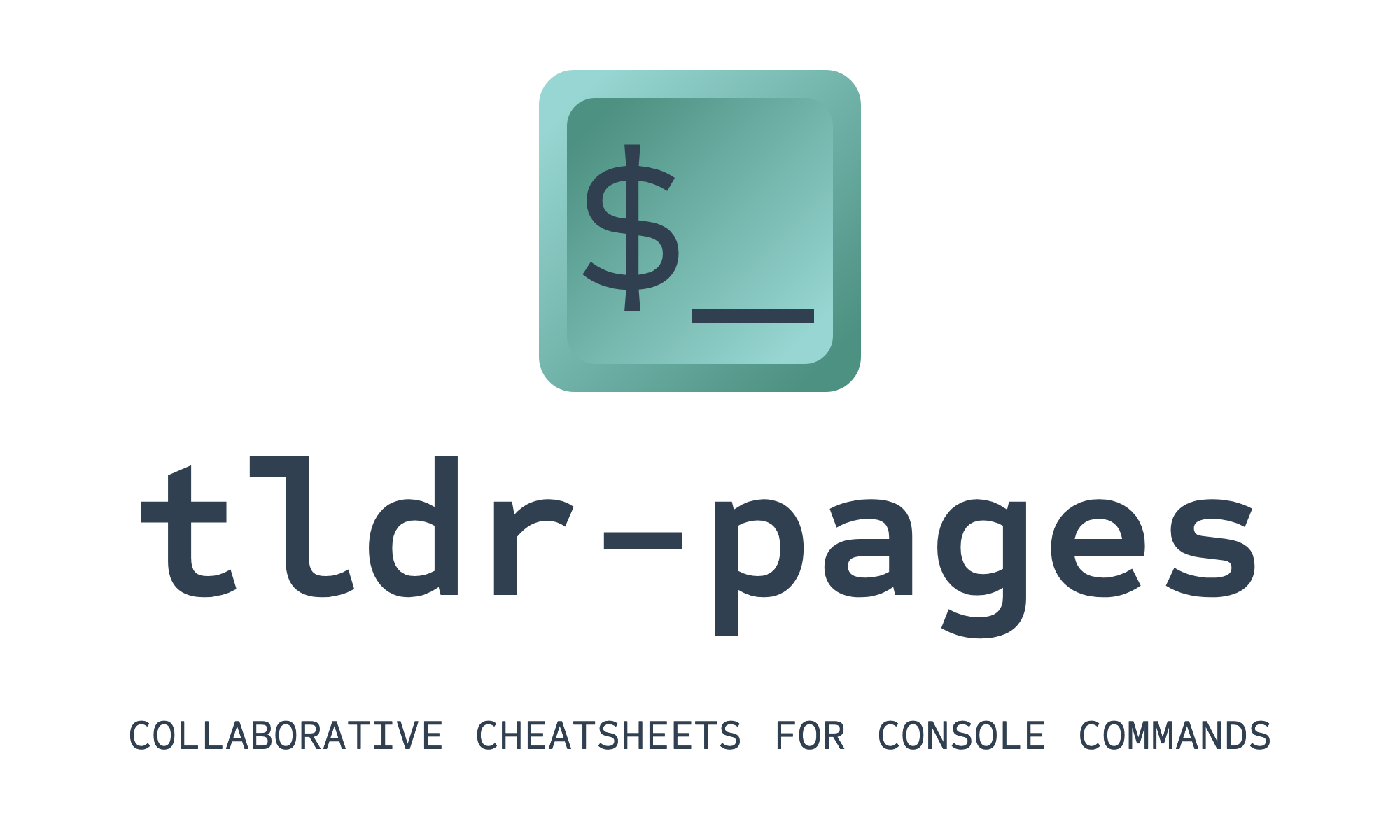|
|
||
|---|---|---|
| .github | ||
| contributing-guides | ||
| images | ||
| pages | ||
| pages.da/common | ||
| pages.de | ||
| pages.es | ||
| pages.fr | ||
| pages.hbs/common | ||
| pages.hi/common | ||
| pages.it | ||
| pages.ja | ||
| pages.ko/common | ||
| pages.ml/linux | ||
| pages.nl/windows | ||
| pages.pl/common | ||
| pages.pt_BR | ||
| pages.pt_PT | ||
| pages.ru/common | ||
| pages.ta/common | ||
| pages.zh | ||
| pages.zh_TW/common | ||
| scripts | ||
| .editorconfig | ||
| .gitignore | ||
| .markdownlintrc | ||
| CLIENT-SPECIFICATION.md | ||
| COMMUNITY-ROLES.md | ||
| CONTRIBUTING.md | ||
| GOVERNANCE.md | ||
| LICENSE.md | ||
| MAINTAINERS.md | ||
| README.md | ||
| package-lock.json | ||
| package.json | ||
README.md
What is tldr-pages?
The tldr-pages project is a collection of community-maintained help pages for command-line tools, that aims to be a simpler, more approachable complement to traditional man pages.
Maybe you are new to the command-line world? Or just a little rusty?
Or perhaps you can't always remember the arguments to lsof, or tar?
It certainly doesn't help that the first option explained in man tar is:
-b blocksize
Specify the block size, in 512-byte records, for tape drive I/O.
As a rule, this argument is only needed when reading from or writing to tape drives,
and usually not even then as the default block size of 20 records (10240 bytes) is very common.
There seems to be room for simpler help pages, focused on practical examples. How about:
This repository is just that: an ever-growing collection of examples for the most common UNIX, Linux, macOS, SunOS and Windows command-line tools.
How do I use it?
A popular and convenient way to access these pages on your computer is to install the Node.js client, which is supported by the tldr-pages project maintainers:
npm install -g tldr
That way you can write tldr tar in the terminal to show the tldr page for tar,
just like you would write man tar to show its manpage.
There are also various other clients provided by the community, both for the command line and for other platforms:
- Alfred Workflow
- Albert Plugin
- Android clients:
- tldroid, available on Google Play (outdated)
- Bash clients:
- C# client
- C client:
brew install tldr - Chrome Extension available on Chrome Web Store
- Crystal client:
brew install porras/tap/tlcr - Dart client:
pub global activate tldr - Dash docset:
Open
Preferences>Downloads>User Contributedand findtldr pagesin the list - Discord Bot: Follow the building instructions or use a privately hosted version
- Docker images:
- tldr-docker - Run the
tldrcommand via a docker container:alias tldr='docker run --rm -it -v ~/.tldr/:/root/.tldr/ nutellinoit/tldr'
- tldr-docker - Run the
- Elixir clients:
- ExTldr.
- TLDR Elixir Client (binaries not yet available)
- Emacs client, available on MELPA
- Go clients:
- github.com/pranavraja/tldr:
go get github.com/pranavraja/tldr(or platform binaries) - 4d63.com/tldr:
go get 4d63.com/tldrorbrew install 4d63/tldr/tldr(or platform binaries) - github.com/elecprog/tldr:
go get github.com/elecprog/tldr(or platform binaries) - github.com/isacikgoz/tldr:
go get github.com/isacikgoz/tldr(or platform binaries)
- github.com/pranavraja/tldr:
- iOS clients:
- tldr-man-page, available on App Store
- tldr-pages, available on App Store
- Haskell client:
stack install tldrorapt-get install tldron Debian-based distributions - Node.js client:
npm install -g tldr - OCaml client:
opam install tldr - Perl5 client:
cpanm App::tldr - PHP client:
composer global require brainmaestro/tldr - Python clients:
- tldr-python-client:
pip install tldrorpacman -S tldron Arch Linux - tldr.py:
pip install tldr.pyorapt-get install tldr-pyon Debian-based distributions
- tldr-python-client:
- R client:
devtools::install_github('kirillseva/tldrrr') - Ruby client:
gem install tldrb - Rust client:
cargo install tealdeer - Vim Client
- Visual Studio Code extension available on Visual Studio Code Marketplace
- Web clients:
- tldr.jsx: http://tldr.ostera.io/
- DistroWatch
- tldr.ooops.me: web client with multilingual support
There is also a comprehensive list of clients in our Wiki.
How do I contribute?
- Your favourite command isn't covered?
- You can think of more examples for an existing command?
All tldr pages are kept as markdown files right here in this repository,
so you can edit them directly and submit your changes as pull requests.
All contributions are welcome! We strive to maintain a welcoming and collaborative community. Have a look at the contributing guidelines, and go ahead!
Similar projects
-
Cheat allows you to create and view interactive cheatsheets on the command-line. It was designed to help remind *nix system administrators of options for commands that they use frequently, but not frequently enough to remember.
-
Bro pages are a highly readable supplement to man pages. Bro pages show concise, common-case examples for Unix commands. The examples are submitted by the user base, and can be voted up or down; the best entries are what people see first when they look up a command.
-
eg provides detailed examples with explanations on the command line. Examples come from the repository, but
egsupports displaying custom examples and commands alongside the defaults. -
devhints Rico's cheatsheets are not just focused on the command line and include a plethora of other cheatsheets related to programming.
What does "tldr" mean?
TL;DR stands for "Too Long; Didn't Read". It originates in Internet slang, where it is used to indicate that a long text (or parts of it) has been skipped as too lengthy. Read more in Wikipedia's TL;DR essay.






